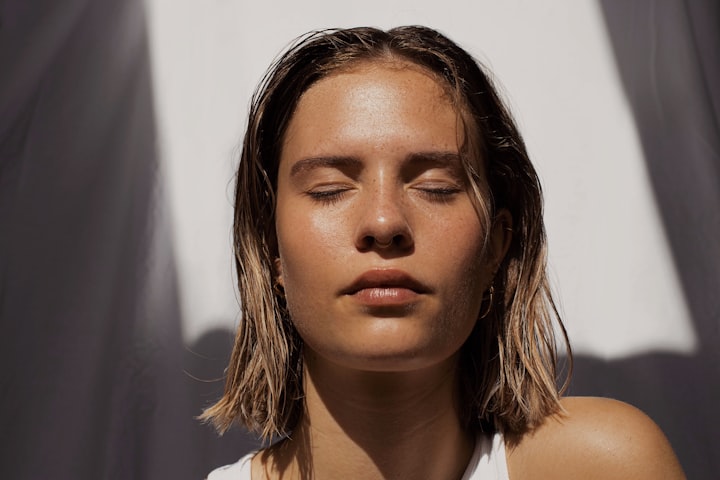A Miracle In A Bottle
Antioxidants Fight The Signs Of Premature Aging

By: Marlene Affeld
Do you cringe every time you glance in the mirror? Are you concerned about the latest wrinkle? We all hate to see the visible signs of aging appear on our skin. Fine lines, wrinkles, and age spots are not welcome. It seems we all want to look younger than our chronological age. The search for the fountain of youth is not a new idea. Medical research has been pursuing that goal for decades. Today, however, recent advances in medical data focused on the effect of antioxidants on skin tissue, offer new and exciting options in anti-aging skincare.
Scores of scientific studies conclude the formation of free radicals to be the primary contributing factor in skin aging. Free radicals are reactive molecules that damage cellular structural membranes: a progressive degenerative process that can result in accelerated aging. The destructive effects of free radicals are introduced internally through normal metabolism and externally from the introduction of various oxidative stresses.
Oxidative stresses include sunlight, air pollution, alcohol, cigarette smoke, and emotional stress. Stress is one of the most age-impacting factors. Stress produces adrenaline, which restricts blood flow to the skin and generates deadly and destructive free radicals. The internal production of free radicals accelerates as we age while our defenses against the effects of free radicals decline with age. The resulting imbalance promotes progressive damage of cellular tissue and accelerated aging. Scientists studying the effects of free radicals now theorize that “aging” is the slow cumulative oxidation of body tissue over a lifetime.
Are You Ready For Some Good News?
Occurring naturally in plant-based foods, such as wine, coffee, chocolate, green and black tea, fresh fruits, and vegetables, antioxidants protect against and stop cell and tissue damage by scavenging free radicals.
Antioxidants protect skin cells by neutralizing damage from external forces, including temperature, wind, pollution, and the sun, while offsetting the damage from internal factors such as metabolism and emotional stress. These chemicals enhance skin repair and strengthen blood vessels.
Other foods rich in antioxidants include red grapes, pomegranates, goji berries, blueberries, eggplant, and legumes such as kidney, pinto, and black beans.

There are more than a thousand different antioxidant compounds. However, the ones we hear the most about are lycopene, found in tomatoes, flavonoids, found in chocolate (my favorite), and resveratrol, found in wine. Other popular antioxidants you may be familiar with include niacinamide, polyphenols, coenzymeQ10, vitamins C and E, catechin, phenol, selenium, manganese, zeaxanthin and carotenoids such as beta-carotene found in carrots.
The research confirming the anti-aging “magic” of antioxidants is clear. Not only do antioxidants combat free-radical damage responsible for the hidden and not so secret signs of aging, they significantly enhance the effectiveness of sunscreen applied to prevent sun damage. A combination of antioxidants and sunscreen is the best defense possible against many of the unwelcome signs of aging, including sagging, fine lines, age spots, wrinkles, dryness, dullness, and discoloration of the skin. Applied again at night in combination with a moisturizing night cream, the regular application of antioxidants promotes skin healing and cellular repair.
Increase Your Dietary Intake Of Antioxidants
• Add flavor and antioxidants to teas, coffee, and breakfast smoothies with a dash of cinnamon, clove, ginger or turmeric.
• Loaded with antioxidants, nuts, seeds, and dried fruit are excellent for snacking. Choose healthy snacks without added salt or sugar.
• Increase your intake of fresh fruits, berries, and green leafy vegetables.
Should I Take Antioxidant Supplements?
Antioxidant supplements cannot replace a healthy diet high in fruits, vegetables, lean meats, whole grains, and dairy products. Extensive government research indicates that antioxidant supplements should only be taken under the advice of your healthcare provider as they may interact with other medications. High doses of antioxidant supplements increased health risks. Smokers, taking high doses of beta-carotene, increase their risk of lung cancer. Persons supplementing with high doses of vitamin E may have a higher than normal risk of stroke or prostate cancer. Make sure to advise your health care provider of all prescription and over-the-counter (OTC) medication you take daily, and any other integrative or complementary wellness approaches you use to manage your health and wellbeing.
Topical Application Of Antioxidants 100 Times More Effective Than Diet or Supplements
Although it is essential to maintain a healthy diet and obtain antioxidants from natural foods, supplements can help provide the dosage needed to affect skin repair. However, scientists now tell us that antioxidants applied topically, are up to 100 times more effective than antioxidants obtained from our diet.

Antioxidants top the list ingredients in the majority of over-the-counter anti-aging ingredients. Antioxidants are nutrients, which, when applied topically to aging skin, neutralize and destroy free radicals that damage and devour the skin’s collagen supply. All antioxidants applied topically help heal dry and damaged skin. There is no “best” antioxidant, as each has different properties: i.e., ubiquinone, glutathione, and superoxide dismutase are antioxidants that fight skin damage caused by atmospheric pollutants. The antioxidants in vitamin C brightens and tightens tired, dull-looking skin.

Known for its remarkable skin-rejuvenation properties, coffee berry extract {marketed under the trade name CoffeeBerry Extract, derived from the coffee plant coffee Arabica, is a stellar source of antioxidants. Research studies indicate that the same plant that provides your morning “java jolt” has potent anti-aging properties to enhance the appearance of aging skin. CoffeeBerry contains powerful polyphenols, including ferulic acid, quinic acid, chlorogenic acid, and condensed proanthocyanidins.
Research studies reveal that CoffeeBerry extract dramatically improves the texture of the skin: reducing the appearance of fine lines and wrinkles without skin irritation or allergic reactions. CoffeeBerry is a more powerful and faster-acting antioxidant than white tea, green tea, vitamins C and E or grape seed extract: CoffeeBerry extract tests up to ten times more powerful than green tea.
What do vitamin C, vitamin E, green tea, carrot seed oil, and CoffeeBerry extract have in common? They all contain significant amounts of powerful antioxidants beneficial to sagging, tired aging skin. When searching for a natural product to combat wrinkles and dull, dry skin, look for a product containing one or more of these powerful ingredients. Keep in mind that the effects of antioxidant therapy can vary significantly depending on the antioxidant concentrations.
Dermatologists and skincare research teams agree: the best approach to manage skin health is a combination of products containing a diverse array of antioxidants. Previously available only by prescription, topically applied antioxidant formulations are now available in a diverse array of multivariate combinations delivered through over-the-counter skincare products.
References:
National Center For Complementary and Integrative Health – Antioxidants
https://nccih.nih.gov/health/antioxidants/introduction.htm
United States Library of Medicine - Effects of antioxidant supplementation on the aging process
https://www.ncbi.nlm.nih.gov/pmc/articles/PMC2685276/
United States Library of Medicine - Free Radicals, Antioxidants in Disease and Health
https://www.ncbi.nlm.nih.gov/pmc/articles/PMC3614697/
United States Library of Medicine – Antioxidants In Dermatology
https://www.ncbi.nlm.nih.gov/pmc/articles/PMC5514576/
About the Creator
Marlene Affeld
“A passionate writer for more than 30 years, Marlene Affeld’s passion for the environment inspires her to write informative articles to assist others in living a green lifestyle.”






Comments
There are no comments for this story
Be the first to respond and start the conversation.